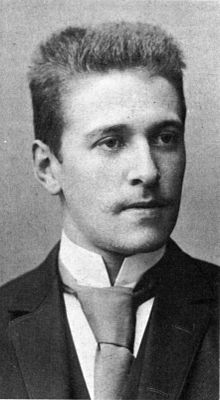Hugo von Hoffmansthal
| Hugo von Hofmannsthal | |
|---|---|
 |
|
| Born |
1 February 1874 Landstraße, Vienna, Austria-Hungary |
| Died | 15 July 1929 (aged 55) Rodaun, Liesing, Austria |
| Occupation | Novelist, librettist, poet, dramatist, narrator, essayist |
| Language | German |
| Citizenship | Austria |
| Alma mater | University of Vienna |
| Spouse | Gertrud Schlesinger |
| Children | Christiane, Franz, Raimund |
Hugo Laurenz August Hofmann von Hofmannsthal (German: [ˈhuːɡo ˈlaʊʁenʦ ˈaʊɡʊst ˈhoːfman fɔn ˈhoːfmanstaːl]; 1 February 1874 – 15 July 1929) was an Austrian prodigy, a novelist, librettist, poet, dramatist, narrator, and essayist.
Hofmannsthal was born in Landstraße, Vienna, the son of an upper-class Austrian mother, Anna Maria Josefa Fohleutner (1852–1904), and an Austrian–Italian bank manager, Hugo August Peter Hofmann, Edler von Hofmannsthal (1841–1915).
His great-grandfather, Isaak Löw Hofmann, Edler von Hofmannsthal, from whom his family inherited the noble title "Edler von Hofmannsthal," was a Jewish merchant ennobled by the Austrian emperor.
He began to write poems and plays from an early age. Some of his early works were written under pseudonyms, such as Loris Melikow and Theophil Morren, because he was not allowed to publish as a student. He met the German poet Stefan George at the age of seventeen and had several poems published in George's journal, Blätter für die Kunst. He studied law and later philology in Vienna but decided to devote himself to writing upon graduating in 1901. Along with Peter Altenberg and Arthur Schnitzler, he was a member of the avant garde group Young Vienna (Jung Wien).
In 1900 Hofmannsthal met the composer Richard Strauss for the first time. He later wrote libretti for several of his operas, including Elektra (1909), Der Rosenkavalier (1911) with Harry von Kessler, Ariadne auf Naxos (1912, rev. 1916), Die Frau ohne Schatten (1919), Die ägyptische Helena (1927), and Arabella (1933).
...
Wikipedia
